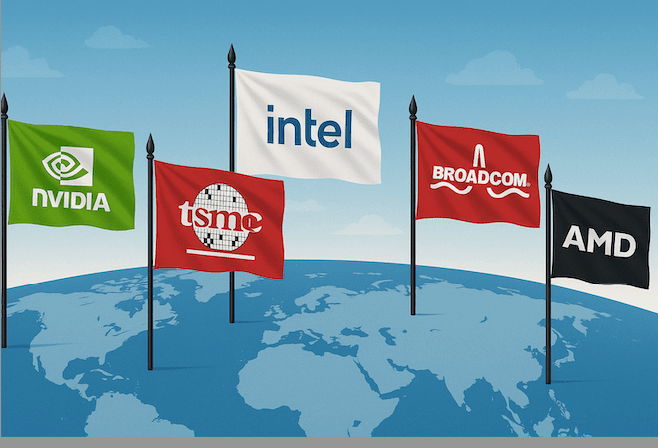
American chip giant Nvidia (NASDAQ: NVDA) announced on Thursday that it will make a strategic investment of $5 billion in its competitor Intel (NASDAQ: INTC), immediately making Nvidia one of Intel's major shareholders with approximately 4% ownership. This investment follows the U.S. government's actions to invest in Intel, reflecting the chip industry restructuring strategy led by the White House.
Intel's stock price surged by 26% after the announcement, while Nvidia's stock price also rose by about 2%. The market reacted enthusiastically, indicating that investors have high expectations for this collaborative project.
The new CEO is surrounded by controversy, with the White House mediating to reach a three-party consensus.
In March of this year, Intel appointed new CEO Lip-Bu Tan, who quickly faced criticism from political figures, including then-President Trump, due to his potential ties to China raising national security concerns. Ultimately, after a closed-door meeting arranged by the White House, Intel agreed to allow the U.S. government to hold 10% of the company's shares as part of a compromise.
Nvidia's participation is seen as part of the White House strategy aimed at strengthening U.S. autonomy in the semiconductor field and reducing reliance on Taiwan and Chinese supply chains.
Collaborative chip development while excluding foundry services poses a potential threat to TSMC
Although Intel and Nvidia will collaborate on multiple generations of PC and data center chips, both sides clearly exclude Intel's foundry business from the cooperation scope. This means Nvidia will not currently entrust the production of its high-end AI chips to Intel.
However, this cooperation still poses potential risks to TSMC, the leading Taiwanese chip foundry, as TSMC is currently the supplier of Nvidia's main AI processors. If Nvidia deepens its cooperation with Intel in the future, it may have a long-term impact on TSMC's operations.
Collaborative development of AI data center and PC chips targets AMD and Broadcom
The products both sides plan to develop include customized central processing units (CPUs) from Intel, which will be integrated with Nvidia's graphics processing units (GPUs) into high-speed linked AI server components. This high-bandwidth chip connection technology will become a key advantage in the AI training and inference processes.
Additionally, Nvidia will provide Intel with exclusive graphics chips, enhancing the competitiveness of its PC processors. This move is seen as a significant challenge to AMD, which has rapidly risen in the desktop and laptop markets in recent years.
At the same time, another competitor, Broadcom, although possessing chip interconnection technology and collaborating with tech giants like Google to develop AI chips, has not commented on this transaction.
Nvidia takes action to combat challenges in the Chinese market, engaging the American political circle
Although this cooperation cannot directly resolve Nvidia's difficulties in the Chinese market, the political benefits are significant. Due to the escalating U.S.-China tech war, Nvidia's H20 chip is restricted by export controls, hindering its sales in the Chinese market.
In mid-August, under the mediation of the Trump administration, Nvidia was allowed to obtain export permits to China on the condition that it delivers 15% of its sales profits to the U.S. government, but Nvidia stated that it has yet to ship any H20 chips to China.
Nvidia CEO Jensen Huang recently accompanied the U.S. president on a visit to the UK, demonstrating the company's active alignment with the White House's political strategy. Hargreaves Lansdown senior analyst Matt Britzman stated: "This move aligns with U.S. policy directions and may help ease export restrictions on high-end chips to China."
U.S. government and private enterprises join forces, Intel's capital lineup grows stronger
This Nvidia investment is Intel's third significant capital injection in recent times, following previous investments of $2 billion from Japan's SoftBank and $5.7 billion in support from the U.S. government, significantly strengthening Intel's capital reserves. CEO Lip-Bu Tan has also promised to adopt a "lean strategy," expanding production capacity only after market demand is confirmed to avoid resource waste.
Product timeline undetermined, AI chip battle enters a new stage
Although both sides have not disclosed the launch time of the first jointly developed product, it has been clearly stated that their existing product roadmap will continue to be executed. This cooperation does not involve patent licensing, and is entirely about commercial product exchange and technology integration, setting a new cooperation model for the industry.
In recent years, Nvidia has been actively expanding the PC and data center CPU market, while Intel is working hard to advance AI server and its own AI chip development. The alliance between the two not only redefines the competitive landscape but may also become a decisive factor in the competition for the AI chip market against rivals like AMD, Broadcom, and TSMC.
This article about the chip alliance reshuffle! Nvidia invests $5 billion in Intel, teaming up to develop AI and PC chips first appeared in Chain News ABMedia.

